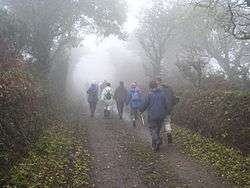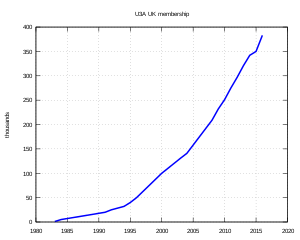University of the Third Age

The University of the Third Age is an international movement whose aims are the education and stimulation of mainly retired members of the community—those in their third 'age' of life. It is commonly referred to as U3A.
There is no universally accepted model for the U3A. Its original conception in France as an extramural university activity was significantly modified in the United Kingdom where it was recognized that most people of retirement age have something to contribute and the emphasis has been on sharing, without formal links to traditional universities.
Many English-speaking countries have followed this geragogic model, whereas continental European countries have mostly followed the French model.
A British U3A website says about "The Third Age" membership eligibility: "U3A membership is not related to a specific age but to a period in one’s life (the third age) after the second age of full-time employment and parental responsibility.
Anybody in their third age can join U3A and this includes people who are working part-time. There is no lower age for membership."[1]
History
France
U3A started in France at the Faculty of Social Sciences in Toulouse in 1973. It was started by Prof. Pierre Vellas. In France, each Third Age University group is mostly associated with a local university. This academic model is used in many other countries, in particular in continental Europe.
In the 1990s the concept was broadened to the notion of the University of All Ages (UTA - université tous âges) and University of Free Time (UTL - université du temps libre).[2] The UFUTA changed its name to Union Française des Universités de Tous Ages[3] (retaining the acronym) whilst Prof Vellas is still the president of the AIUTA (Association Internationale des Universités du Troisième Âge).[4] Most university departments have adopted the title of Université du Temps Libre.[5]
UK and Commonwealth

By the early 1980s, the scheme reached the United Kingdom, where its nature was radically changed to be more a self-help organisation under the influence of its founders, Peter Laslett, Michael Young and Eric Midwinter.[6] This model is also used in Australia, Cyprus, Dominica, New Zealand and South Africa.

In the British model of peer learning, it is acknowledged that retired people have a lifetime of experience and, collectively, a vast amount of knowledge. This is used to arrange a syllabus for each subject where each meeting is normally led by a member of the group with a strong interest or specialist knowledge.[7]
Each U3A group pays a capitation fee to the national coordinating body, and has access to a vast range of resources including a multi-media lending library, special-interest newsletters and contacts with other groups with similar interests. Summer schools are held by special interest groups. Most importantly, each Group is an absolutely autonomous entity, self-financing and self-managing.[8] In 2016 the British U3A reported its 1000th member, at Churchdown, Gloucestershire which has 26 groups,[9] after reporting 950 in 2015,[10][11] running 36,000 courses[12] for 350,000 people.[8]
Most groups are regional in nature, and this has led to the creation in some countries of variations on the U3A. For example, in Cyprus there is a U3A, an organisation called C3A (Cyprus Third Age), which is affiliated to the UK U3A, and P3A (Paphos Third Age).
Central and Eastern Europe
Some Central (and Eastern) European countries were introduced to the U3A quite early: Poland, Czech Republic (formerly part of Czechoslovakia) and above all Slovenia. The Slovenian Third Age University was started by two university teachers in 1984 and has developed into a network of forty universities over the entire country.
There is an online Third Age University in Russia at http://u3a.niuitmo.ru/.
Australia
Australia's first U3A began in Melbourne in 1984. As of 2013, Australia has developed into 250 U3As with approximately 85,000 members. These are based in metropolitan, regional and rural areas, and follow the British self-help model of teaching and learning over a wide range of subject areas, dependent upon the membership's own expertise, knowledge and skills.
U3As in New South Wales, Victoria, the Australian Capital territory, South Australia, Queensland and Western Australia have formed State Networks to support the U3As in their State or Territory with a range of resources. Each Network has its own website from which local U3As can be located. For example, see http://www.nsw.u3anet.org.au which also has links to other State Networks.
In 1998, U3A Online was started to provide cognitively challenging virtual courses for isolated older people from any country. Since then the initiative has been widened to include any person who regards themselves as being in their third age. More than 35 courses, all written and taught by volunteer experts from various countries, are available. In 2009, U3A Online published a paper entitled "Educational initiatives for the elderly". The paper contains contributions from a number of U3A leaders from around the world outlining the status of U3A and U3A-like organisations in different countries. That paper, and other peer-reviewed research studies based on the Successful Aging model, are freely available from http://www.u3aonline.org.au.
Virtual University of the Third Age
On 1 January 2009, after four years of experiments and testing, the Virtual University of the Third Age (vU3A) was launched with the intention of offering the same friendship, support and learning enjoyed by off-line groups. vU3A is open to anyone, in particular those who, by circumstances of isolation, health problems or other restrictions, cannot get to a U3A group.[13] There is a small fee.
Volunteers run the entire operation, including teaching, in cyberspace. There is general agreement that not only physical but intellectual activity enrich and prolong life in the later years. Although primarily for the retired, many U3As open their membership to any people not in full-time employment, thus becoming more inclusive and widening the age range of the membership.
Courses
Typical courses include Art, Classical Studies, Conversation, Computers, Crafts, Debate, Drama, History, Languages, Literature, Music, Sciences, Social Sciences, and Philosophy.[14] Some study groups do not have a prepared syllabus, but draw on reports of current affairs in their topic subject to prompt conversation and research. Some groups are designed to cross disciplinary boundaries, for example, combining Society, Technology and Science in a fashion not practical in more formal academic environments.
U3A groups are well positioned to conduct serious research into local history and genealogy. For example, a group in Eyemouth collected and exhibited many photographs of life and work in the district over the years. Some groups aim to bridge the generation gap in the field of information technology, opening up an exciting new world to many who might have been oblivious of it otherwise. Internet marketing is especially important for members in more remote locations.
There are also many less educationally focused activities, including Games, including bridge tuition and duplicate bridge playing groups; Health, Fitness & Leisure, including countryside walks, Theatre/Concert Clubs, Travel Clubs, and Dance in all its forms.
Newsletter
Many U3As publish local newsletters as do some of their special interest networks. In the UK the Third Age Trust, the national coordinating body in the UK, publishes a national magazine. "Third Age Matters" five times per year plus an educational bulletin, "Sources", for subscribing U3A members three times annually.
The U3A can also provide a valuable resource in considering many local and national issues. Membership includes many with experience and expertise in almost all walks of life and letters. Although strictly non-political, U3A members have time to reflect in a mature fashion on such topics as the operation of public services, crime and punishment, the future of energy supplies, public funding of the arts and so on, and can reply to invitations to engage in public consultations with carefully considered and argued responses.
Bibliography
- Midwinter, E. (2004) "500 Beacons: The U3A Story", Third Age Press UK. KINDLE edition (2014).
- Beckett, Francis. The U3A Story (PDF). Third Age Trust. Retrieved Feb 24, 2016.
- Formosa, M. (2000). "Older adult education in a Maltese University of the Third Age: A critical perspective". Education and Ageing, 15(3): 315-339.
- Formosa, M. (2005). "Feminism and critical educational gerontology: An agenda for good practice". Ageing International, 30(4): 396-411.
- Formosa, M. (2007). "A Bourdieusian interpretation of the University of the Third Age in Malta". Journal of Maltese Education Research, 4(2): 1-16.
- Formosa, M. (2009). "Renewing Universities of the Third Age: Challenges and visions for the future". Recerca, 9: 171-196.
- Formosa, M. (2010). "Lifelong learning in later life: The Universities of the Third Age". Lifelong Learning Institute Review, 5: 1-12.
- Midwinter, Eric C. (1984), Mutual aid universities: a self-help approach to educating older people, Routledge, ISBN 0-7099-3523-4
- Swindell, R. & Thompson, J. (1995). "An international perspective of the University of the Third Age". Educational Gerontology, 21(5): 429-447.
- Swindell, R. (2002). "U3A Online: a virtual university of the third age for isolated older people". International Journal of Lifelong Education 21(5): 414-429.
- Szeloch, H. (2011). "Na naukę nigdy nie jest za późno". "Nowe Życie", (445)9: 11-12.
References
- ↑ "U3A; How to join". The Third Age Trust. 2012. Retrieved 10 September 2015.
- ↑ Chamahian, Aline (2006). "De l'Université du Troisième Âge de Toulouse aux Universités Tous Âges : retour sur le mouvement de constitution des UTA en France" (PDF). Communication au 2eme Congrès de l'Association Française de Sociologie. Retrieved Jan 18, 2016.
- ↑ "Union Française des Universités de Tous Ages". Retrieved Jan 19, 2016.
- ↑ "International Association of Universities of the Third Age". Retrieved Jan 19, 2016.
- ↑ "Université du Temps Libre". Retrieved Jan 19, 2016.
- ↑ "The U3A Story". U3A UK. The Third Age Trust. 2014. Retrieved 28 September 2015.
- ↑ "U3A takes on extreme sports challenge". The Mature Times. June 2014. Retrieved 10 September 2015.
- 1 2 Brown, Andrew (10 April 2015). "In praise of … U3A". The Guardian. Retrieved 10 September 2015.
- ↑ "Churchdown takes our movement into thousands". Third Age Matters. U3A. p. 5. Retrieved Nov 19, 2016.
- ↑ Bennett, Rosemary (7 April 2015). "College that truly stretches the grey matter". The Times. Retrieved 28 September 2015.
- ↑ "Map of UK U3As". The University of the Third Age. Retrieved 28 September 2015.
- ↑ Sturgis, India (10 May 2015). "Britain's most inspiring university: You can study everything from Arabic to Scrabble and even learn to canoe and it's changing the lives of countless over-50s...". The Daily Mail. Retrieved 10 September 2015.
- ↑ Jarolimek, Jan; et al. (31 December 2010). "Conditions and Limitations of Multimedia Senior Education in the Regions" (PDF). Journal on Efficiency and Responsibility in Education and Science. 3 (2): 66–78. ISSN 1803-1617.
- ↑ "Always Learning: Staying mentally active in retirement with U3A". Retire Savvy UK. 27 January 2015. Retrieved 28 September 2015.
External links
| Wikimedia Commons has media related to University of the Third Age. |
- U3A in the UK
- U3A in Australia:
- U3A in Belarus
- U3A and variations in Cyprus:
- U3A in the Dominican Republic
- U3A in South Africa
- U3A in Scotland
- U3A in Swansea
- U3A in New Zealand
- International Network for Universities of the Third Age
- An International Perspective of the University of the Third Age. 14 pp
- U3A in Russia: U3A in Russia
- U3A in Spain: